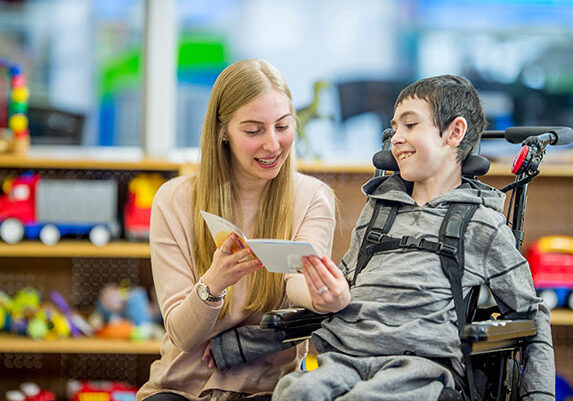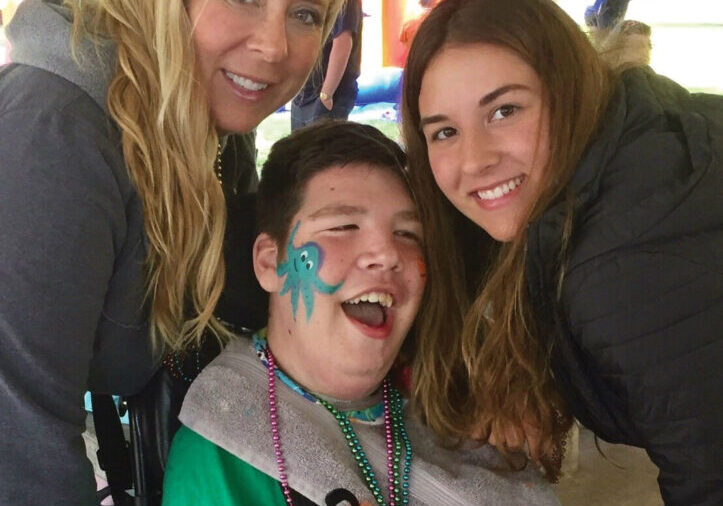Teaching students with special needs is a challenging, rewarding career. Special education programs are designed for students with intellectual, developmental, physical, or emotional delays which can place them behind their peers academically. These students’ needs typically can’t be met in a traditional classroom environment due to their special requirements. Special education programs adapt content, methodology and delivery of instruction to meet each child’s needs. Certified Special Education teachers work with a wide range of student ages, grade levels, and abilities.
Teaching core subjects as well as basic life skills
Part of a special education teacher’s job is to adapt lesson plans for students with disabilities and create inclusive learning environments. They teach the core subjects such as math and language arts while also teaching basic life skills for students with a wide range of abilities.
Special education teachers develop Individualized Education Programs (IEPs) for each student based on observations and assessments. The IEPs are used to set goals and track student progress. Their work doesn’t end in the classroom; they spend a lot of time coordinating with other teachers, administrators, therapists, counselors, and parents. While most special educators work in classrooms exclusively for students with special needs, some work in full inclusion classrooms, including students with and without disabilities.
Ensuring that children with special needs receive the appropriate help early on enhances their ability to learn and succeed later on. Educators who work with children in early childhood typically specialize in assessment, methods, and strategies, and developmental psychology to give the child and their family the resources they need to have the best start to their education.
Demand for teachers who specialize in children with autism has grown significantly. Communication is a primary focus in this specialty because of the communication challenges faced by students with autism in social settings.
Students who have a severe visual impairment or blindness or are deaf or hard of hearing require special assistance in an academic setting. Educators who choose these specializations typically complete coursework in basic and advanced Braille, ASL, and anatomy and physiology of visual and hearing disorders. They also learn how to support students with multiple disabilities, mobility, and orientation issues. They also receive extensive training in using assistive technology and devices.
Special education teachers don’t just teach academics. They spend their days managing social behaviors, sensory needs, and teaching and reinforcing life skills so their students will be as independent as possible when they leave the classroom environment. Like most teachers, their day doesn’t end when the bell rings. Modified lesson plans, preparing for IEP meetings, and other classroom preparations take up several hours before and after school. Being a teacher in a special education classroom requires an inordinate amount of patience, flexibility, dedication, the ability to handle challenging emotional situations, and at times, physical aggression from students. You must also have excellent advocating skills, not be intimidated by tons of paperwork, and be able to appreciate the uniqueness of every student that spends time in your classroom.
Steps in becoming a special education teacher:
First, learn about degree requirements. At a minimum, special education teachers must have a bachelor’s degree. Prospective students should check the school’s accreditation status when looking for degree programs. In some states, only a degree from an accredited school meets the requirements for a teaching license.
Obtain state certification or licensure. Those who are interested in teaching at public schools need to apply for state certification or licensure. Student teaching experience is a requirement, and most states require candidates to pass specialized exams and background checks.
Consider an area of specialization. Students earning a bachelor’s degree in special education may choose to concentrate their studies on a certain aspect of special education, such as elementary education or autism spectrum disorders. Depending on the program, these specialties may require additional coursework or work experience.
Most specialty fields in special education require the completion of a master’s degree at a minimum. Some of the more common areas of specialty are special education for early childhood (ages 0-3), autism spectrum disorders, and working with students who have visual impairments or are deaf/hard of hearing.
Posted in: Special Needs
Comment Policy: All viewpoints are welcome, but comments should remain relevant. Personal attacks, profanity, and aggressive behavior are not allowed. No spam, advertising, or promoting of products/services. Please, only use your real name and limit the amount of links submitted in your comment.
You Might Also Like...

Challenges and Benefits of Having a Sibling with Special Needs
Having a sibling with special needs is a unique experience that provides both challenges and benefits to children. While there is no doubt that they love their sibling with special […]

Cooking — A Functional Life Skill That Fosters Independence
Functional skills are the abilities that enable a person to be independent. One of the most important goals of any parent or caregiver of a child with special needs is […]

Celebrating Inclusivity At The Special Needs Carnival In Durham
For many people with disabilities, carnivals can be a stressful and anxiety-filled experience. Primarily geared toward “typical” community members, they often lack accessibility and can be a breeding ground for […]

Emotional Benefits Of Pet Dogs For Kids
Dogs have long been celebrated as “man’s best friend.” Not only are they adorable, friendly, and fun to play with, they also provide incredible emotional benefits. Many people feel happier […]





